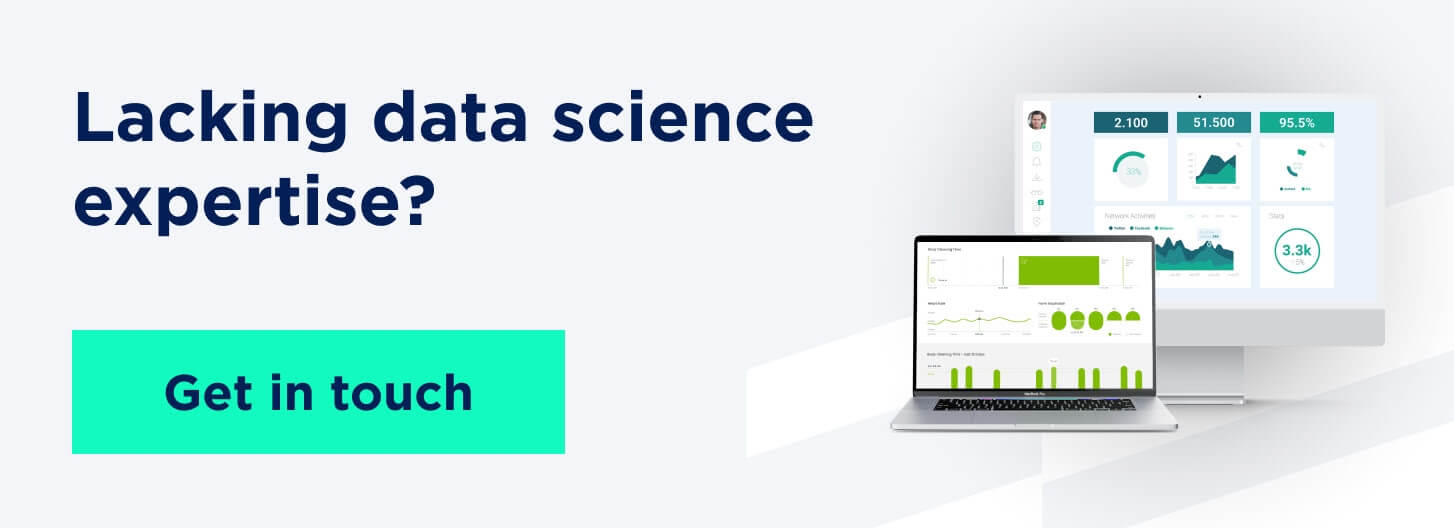Each year, companies lose $12.9 million on average due to poor data quality. Aside from the impact on the business's financial state, bad data analytics negatively affect decision-making, leading to missed opportunities and inefficient business performance.
Keep reading to discover the main reasons for outsourcing data science, find its main benefits, and learn how to mitigate common outsourcing risks. You will also get best practices for delegating data science to a trusted provider.

What is data science outsourcing?
Data science outsourcing is a strategic process of delegating data-related tasks to external experts, well-versed in various areas of the field. Third-party organizations usually get hired to complete a specific task such as developing a data analytics solution or handling data collection, modelling, cleaning, or interpretation. It’s also a good solution for those lacking expertise in the specific field such as AI or machine learning and needing a quick solution – hiring new team members or training existing staff would be too time-consuming. The outcome of efficient outsourcing is usually a better understanding of company’s operations and improved Business Intelligence.
Why companies outsource data science services – and when it makes sense?
High-performing companies are 2.6x more likely to treat data analytics as a powerful asset for securing a competitive advantage in the market, according to Deloitte. Today, companies of all sizes strive to adopt a “data-first” approach to elevate their business strategy with accurate real-time analytics. Data science has turned into a pivotal driver that accelerates business growth.
Data science often utilizes a variety of comprehensive tools, including machine learning, AI, and advanced algorithms to extract meaningful business-related insights from large unstructured data assets. As a result, your business can make more strategic and well-informed decisions, drive innovation, and enhance customer experience. However, to get high-quality insights, you need to secure high-quality input, meaning your data must be error-free and structured to fit for further analysis. This task demands a vast set of skills and expertise and that’s when software outsourcing comes in handy.
With big data outsourcing, you get specialists who will handle the data preparation process, from collection and normalization to labeling and cleaning it up. Next, data scientists build prediction models and uncover general patterns and trends that your business can use to refine its operations and succeed in a highly competitive market. Depending on your needs, you can hire a data science team either to take over your data processing completely or to work on a specific task.
Top benefits of outsourcing data science services for business growth
If you are still hesitant about data science outsourcing, explore the ways it can benefit your business:

Access to a global talent pool
Finding a professional data scienсe team can be challenging as such specialists are in short supply. Data science outsourcing closes this talent gap and provides access to the top-tier experts across the world. This allows you to find data science professionals with specific expertise in your niche that is not easily available within your local talent pool.
Cost-effectiveness
The recruitment process requires a substantial investment of both time and financial resources. Outsourcing data analytics services will save you money as your vendor handles the hiring process, and you don’t need to pay extra for office equipment or employee benefits. Partnering with skilled data scientists locally will cost you considerably more, especially if you demand specific knowledge and skill sets. In contrast, the outsourcing market provides a wide selection of specialists with varying hourly rates to fit your requirements and budget.
Better data quality
With well-vetted data specialists who know how to manage, store, and process large data assets securely, you will gain valuable insights to improve your business strategy. As a result, your company can make prompt data-driven decisions to streamline business processes, allocate resources more efficiently, understand customer behavior, and drive profits.
Advanced technologies
Outsourcing data analytics grants you access to cutting-edge technologies that are available at the moment. Most outsourcing companies leverage the latest tools and innovative techniques to provide better solutions for their clients and be ahead of their competitors. This allows your business to benefit from the world-class software for analyzing, structuring and visualizing data without substantial investments to cover licensing fees.
Improved scalability
Flexibility is one of the top business priorities, and outsourcing enables easy scale-ups and scale downs depending on your scope of work. As your business grows, so do your datasets, and your team may be unable to handle the work volume without external support. Outsourcing work related to data analytics can support the expansion of your team, speed up development processes, while also offering the flexibility to change the number of experts after the job is done.
Main risks of data science outsourcing – and how to mitigate them
Outsourcing data science services brings some risks that can negatively impact your business. Gladly, there are ways to avoid them and benefit from data science and analytics to the fullest. Let’s discover the most widespread risks below:
Communication and project alignment issues
Communication issues are not uncommon when outsourcing to third parties. The likelihood of miscommunication is higher in multicultural teams, especially at the outset of a project, and the issues are usually related to cultural nuances and language differences. To prevent any problems, write a summary of early meetings and distribute it among all team members to ensure everyone is on the same page. Try to avoid culturally specific jargon in your daily communication. Last but not least, define primary communication channels and agree upon the frequency of meetings – weekly, biweekly, or monthly – to discuss issues and bring updates timely.
Lack of control over data science workflows
Outsourcing can feel like losing control over workflows, as it brings challenges related to different time zones and reliance on remote tools, as well as your vendor's preparedness to mitigate these challenges.
Problems can be easily prevented and managed through clear communication channels, shared dashboards, and agreed-upon metrics that allow all sides to remain aware of the progress without micromanagement. Early feedback loops and status updates also help prevent minor issues from escalating, identify and address blind spots early, ensure mutual understanding, and reduce the need for frequent check-ins later in the process.
Security issues
The possibility of security risks is increasing, especially when you delegate data science tasks with sensitive information to a third-party vendor. Yet, this risk can be easily avoided by ensuring your data science provider has all security compliances in place. Ensure that your outsourcing partner holds ISO 9001:2015 and ISO 27001:2013 certifications, which confirm that they apply the best security practices to protect customer data and provide the highest quality control. When signing a contract, be sure to document all the security measures your service provider must follow and the legal and financial consequences for non-compliance.
How we protect your data when outsourcing
Considering the risks related to data security, Lemberg Solutions has developed a thorough and meticulous approach to protecting your information at every stage of outsourcing data science services. Our key security measures include the following:
- Legally binding protections: We require all parties to sign strict nondisclosure agreements (NDAs) and intellectual property (IP) contracts. This way, you can be confident that your business assets remain yours alone.
- GDPR compliance: Our workflows are fully GDPR-compliant and meet all legal standards for processing and storing personal data.
- Secure infrastructure and controlled access: We use secure virtual private cloud (VPC) environments with continuous audit logs to ensure absolute transparency. To eliminate internal risks and limit data handling to authorized specialists only, we apply role-based access controls.
- Data encryption: With advanced end-to-end encryption, we keep your data secure during transmission and storage, preventing unauthorized logs or breaches.
How to outsource data science services step by step?
Looking for a reliable data science outsourcing provider is quite a challenge; however, with our best practices, this process can be easier to navigate:
Define your needs
Before searching for a reliable vendor, identify what gaps in your business you aim to address through data science outsourcing. Once you determine areas that demand improvement, you can outline a detailed scope of work by specifying the exact tasks you need to cover. Define your expectations regarding deliverables, deadlines, and budget. Having a clear scope will help you better understand what expertise and skills you require from your data science services provider. If you still hesitate on where to begin with your business needs and requirements, make sure your vendor provides a solution discovery service and request it to get your project requirements right from the start.
Research the providers
When you clearly understand your needs, you can conduct thorough provider research. Take a look at our short guide on selecting a reliable data science services provider for your project:
- Explore platforms like Clutch and GoodFirms to search for the top data science companies and check their reputations based on client testimonials.
- Check potential providers' websites to assess whether they have the required domain knowledge and industry-recognized certifications. Also, remember to review their case studies to ensure their experience with projects like yours.
- From the extensive list of companies, narrow down the best ones and contact them to share your project’s ideas. Be sure to ask about data collection and processing methods and procedures to ensure the highest standards of security and quality.
- After discussing all the cooperation details, choose one provider to outsource data science that matches your requirements and budget.
Establish a clear cooperation agreement
The cooperation agreement is a key stage that will determine the success of your project. Specify all project details – key milestones, defined deadlines, security measures, and legal requirements. Make sure to select the appropriate cooperation model that best suits your project, as the payment terms and collaboration conditions depend on it.
Include in the agreement the communication channels and a clear division of responsibilities to ensure smooth workflow. A cooperation agreement safeguards your business against miscommunication and security issues that can negatively affect your company’s operations and brand reputation.
Start with a pilot project or PoC
Begin with a small pilot project to validate the capabilities of your chosen technical partner. With this task, the vendor will have the opportunity to demonstrate how they align with the goals you've agreed upon, whether they respect deadlines, work standards, and security measures. A reliable vendor will not have problems with this step; it only strengthens collaboration and fosters trust.
Ensure long-term support and MLOps setup
Continuous monitoring, training, updates, and improvement of deployed models will keep your data science solution efficient long after your cooperation with the vendor ends. With regular updates, your business can adapt to changing requirements and scale without compromising on data quality or security. Ensure that your outsourcing partner offers long-term support and a proper MLOps setup.
Why Lemberg Solutions is a trusted data science outsourcing company
Lemberg Solutions has an ideal match of skill sets and expertise with our senior-level specialists who hold Ph.D.s in data science. We have been providing first-class solutions for companies specializing in healthcare, industrial IoT and manufacturing, energy, e-commerce, and agriculture for over 15 years. Discover the success stories of our clients who entrusted us with their data science projects:
Computer vision-based solution for Barkom Ltd – improving efficiency with computer vision

Challenge: Barkom Ltd, an agricultural company specializing in breeding pigs and cattle, came to us with a request to automate the process of monitoring pigs’ weight. A major obstacle here was the insufficient amount of training data.
Solution: To address the challenge, our specialists created a hardware solution to collect data. Later on, they developed a weight recognition algorithm based on this data. With non-iterative neural networks and a tailored image recognition algorithm, our team developed a computer vision-based prototype that accelerates the weight monitoring process with improved recognition accuracy.
Outcome: We helped our clients achieve 98% weighing accuracy for moving livestock and reduce the time farm workers need to weigh the animals by a factor of 24.
ML-based motion detection and classification system for Boxx+ – accurate motion detection with ML

Challenge: Boxx+, a startup offering a workout app for boxing enthusiasts, wanted to build a solution for detecting and classifying punches to enhance the boxing routine of their end users.
Solution: To build a highly accurate model, our data science experts collected a dataset by analyzing how different users performed all punch types. We trained the model with the gathered data and integrated it into SDKs.
Outcome: As a result, our client got an innovative model for their users to level up their boxing activity. Detecting versatile punch types, the app is available for use by boxers with any training level.
Algorithm and firmware development for FHCS – optimizing hardware with smart algorithms

Challenge: Freudenberg Home and Cleaning Solutions (FHCS), a company specializing in cleaning products and systems, needed help implementing new functionality by incorporating a unique algorithm.
Solution: Our data science experts analyzed the data provided by FHCS and built an algorithm to provide users with instructions based on real-time data.
Outcome: Our embedded engineers successfully implemented the algorithms into the firmware solution, thus enhancing customer experience.

Outsource your data science project with confidence — key takeaways
Data is the backbone of business success, and to get the most value from it, you need to leverage data science potential. A data-driven approach is not a fancy trend but a demand for modern companies to stay relevant in the highly competitive market. Although outsourcing data science tasks provides numerous benefits, it also comes with certain risks. However, with a reliable data science services provider, you don’t need to worry about them. A trustworthy outsourcing company can transform your business operations and propel innovative solutions – all based on advanced analytics. Reach out to discuss your data science needs!
FAQ
What types of data science tasks are best suited for outsourcing?
Outsourcing is an excellent option for companies that require specialized data science skills or solutions quickly and are not willing to hire specialists or to grow the expertise in the company. It also works for organizations that generate enormous amounts of data daily, but don’t possess the tools and resources for effective analysis of this data. Frequently outsourced services include data collection, modelling, cleaning, and interpretation, as well as development of AI or machine learning solutions.
How can I retain control over my data and models when outsourcing?
The key to maintaining control is to set clear agreements before the work begins. A reliable vendor offers strong security measures, including strict nondisclosure agreements (NDAs) signed by all parties, intellectual property (IP) contracts, role-based access to data, and GDPR-compliant processes. Moreover, virtual private cloud (VPC) environments ensure transparency, while advanced end-to-end encryption prevents unauthorised access to logs or breaches.
Can I outsource only a part of my data science workflow (e.g., model deployment or annotation)?
Yes, and many businesses opt for this model. Partial outsourcing gives access to cutting-edge expertise and industry best practices in a matter of days or weeks while the majority of workflows remain handled and managed by the in-house team. Moreover, outsourcing partners often offer ready-to-use resources for your team to implement.
How do outsourced teams typically collaborate with in-house data teams?
We, as a vendor, believe that effective collaboration between internal and third-party teams relies on three main pillars – well-defined communication channels, transparent processes, and project management tools that are used. Having these, teams achieve complete transparency over the workflows, remain on the same page regarding changes and updates, can exchange ideas and concerns quickly, and solve issues before they become significant.
What should data science outsourcing agreement (SLA or contract) include?
Data science outsourcing contracts or Service Level Agreement (SLA) should non-negotiably outline the scope of services, performance metrics, standards, and expectations, roles and responsibilities. It also clearly defines timelines, reporting and monitoring procedures, problem management protocols, termination conditions, security measures, and adherence to legal and regulatory compliance.
